The resilience of the health sector was tested when the COVID-19 pandemic impacted global economies and health sectors simultaneously in 2020. Routine health programmes in Nigeria, such as childhood immunisation, reproductive health and maternal health services were disrupted, and it was clear that our health systems were not resilient enough to protect us from major public health threats. “Building back better” since then has meant that there needs to be a greater focus on making the necessary investments to strengthen weakened health systems. One thing has been certain though: we don’t have the luxury of time.
As the year draws to a close, many significant health interventions and events have taken place in 2022 that are shaping the health sector in Nigeria, as the country builds back better and looks to strengthen health systems in preparation for future public health emergencies.
There are ten focus issues that defined the Nigerian health sector in 2022.
(1) Lancet Nigeria Commission Report: Investing in health
In March, the Lancet Nigeria Commission launched its report titled — Investing in health and the future of the nation. Advocating for a new social contract on health that redefines the relationship between the citizen and the state, the report called for the implementation of a “One Nation, One Health” policy that prioritises and accelerates the achievement of Universal Health Coverage, using health as a political lever.
The report recommended a reform that ensures a locally delivered healthcare system that provides health insurance coverage for the 83 million Nigerians who cannot afford to pay premiums, a figure which, according to the just released 2022 Nigeria Multidimensional Poverty Index, has risen to 113 million. This reform will not be possible without establishing innovative financing mechanisms and ensuring efficient utilisation of existing resources — a very prominent theme of discussion at strategic health events convened over the course of the year.
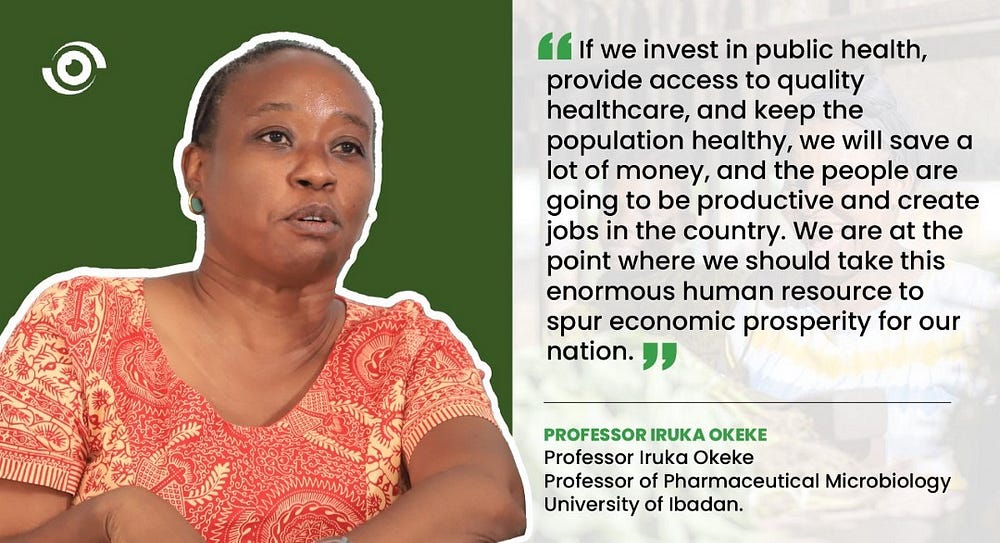
(2) Re-imagining Primary Health Care (PHC) financing
Adequate funding is essential for a well-functioning health system. Its lack thereof negatively impacts service delivery in any health system, including primary healthcare. Nigeria must prioritise its primary healthcare system including its financing mechanisms. Beyond allocating funds, it is also important to ensure the timely release as well as efficient and transparent utilisation of the allocated funds.
The greater focus on strengthening primary health care was also seen during the ‘Re-imagining Primary Health Care’ summit convened in March 2022 by the Federal Ministry of Health (FMoH) and the National Primary Health Care Development Agency (NPHCDA), discussing a transformative plan to improve and expand primary health care in Nigeria by the year 2030. There was also a commitment made by the Nigeria Governors’ Forum (NGF) in August to increase funding for Primary Health Care in support of the PHC Leadership Challenge Initiative and the conversations at the ‘PHC Financing Forum’ in October, all centred around optimising Nigeria’s PHC system by ensuring sustainable financing mechanisms.
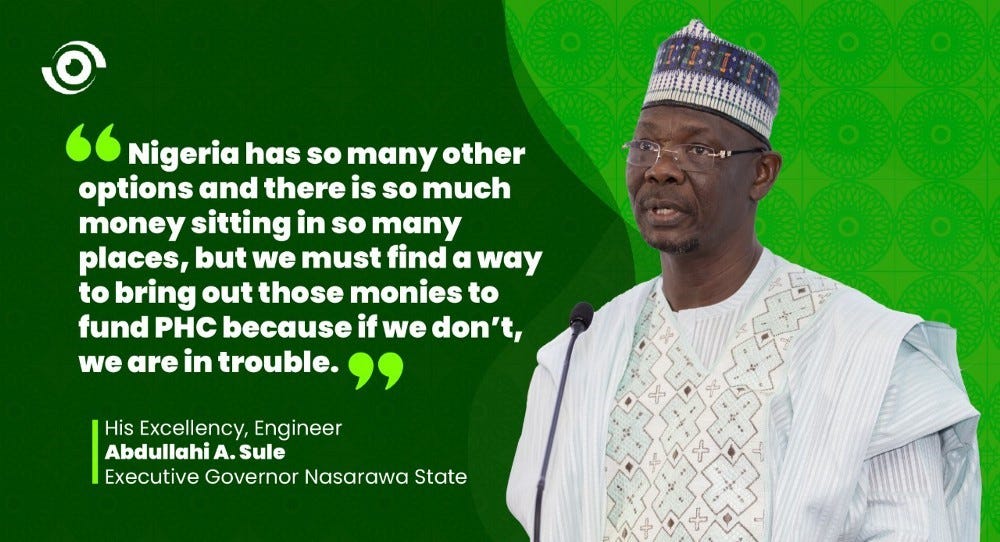
(3) Decentralising Nigeria’s Health Security
Mpox (formerly called monkeypox) and Marburg Virus outbreak, and the resurgence of Ebola in Uganda, served as a reminder that the world is more connected than ever, therefore, governments at all levels must take bold, decisive, and sustained steps to make the financial and political investments critical to strengthen Nigeria’s health security.
The conversation at the ‘Decentralising Health Security: Lessons From COVID-19’ policy dialogue organised by Nigeria Health Watch emphasised the need for the country to build a more resilient health security architecture by boosting sub-national capacity to prevent, detect, and respond to infectious disease outbreaks. This requires establishing a well-resourced sub-national health system and ensuring the provision of quality health care at the PHC level, without which the goal to strengthen sub-national health security might be unattainable.

(4) Mandatory health insurance
Signed into law in May 2022, the National Health Insurance Authority (NHIA) Bill 2022 was part of government’s effort to attain universal health coverage (UHC). The Bill which made health insurance mandatory for all Nigerians included the ‘Vulnerable Group Fund’ (VGF), to ensure coverage for over 83 million Nigerians who cannot afford to pay premiums, as proposed by the Lancet Nigeria Commission report.
Government must accelerate the operationalisation of the NHIA Act, including establishing the VGF, which was not included in the ‘Special Intervention Fund’ in the proposed 2023 health budget.
There is also urgent need for sustained public education on health insurance to ensure that citizens are aware of its existence, as demand generation will be key to the implementation of mandatory health insurance.
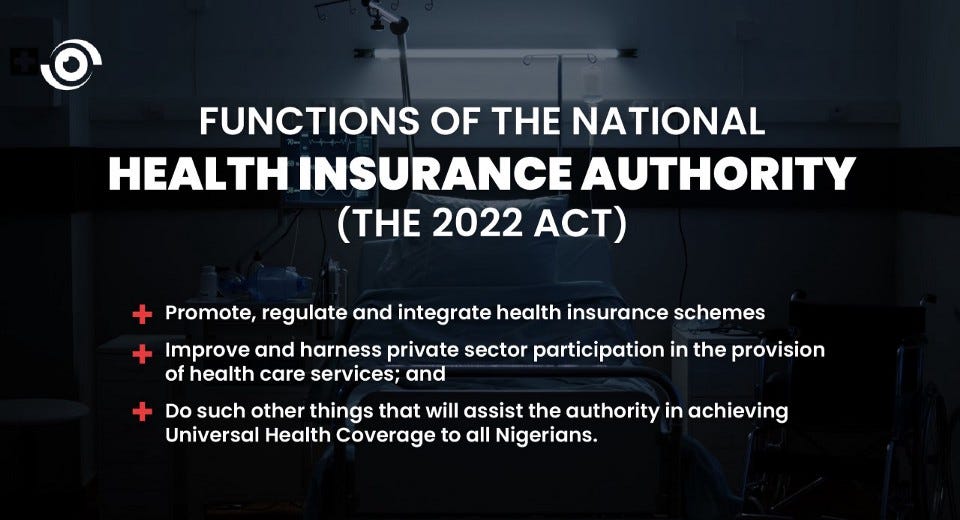
(5) SSB Taxes a win-win strategy?
The Nigerian government signed into law a tax on sugar-sweetened beverage (SSB) as part of the 2021 Finance Act. This now means that there is a N10 charge on each litre of non-alcoholic and sugar sweetened drink. The aim was to improve population health by curbing the rising incidence of non-communicable diseases like diabetes, cardiovascular disease and liver disease.
It is critical for the federal government and stakeholders to design a robust framework for the utilisation of funds, and there has been sustained advocacy for the funds to be earmarked for health. The SSB tax could be a win for public health, a win for government revenue, and a win for health equity. However, public awareness would also be critical in ensuring that consumer are aware of the harmful impact of SSBs and evidence from other countries that have implemented a similar sugar tax shows that a higher increase in prices of SSBs had greater impact on reducing consumption.
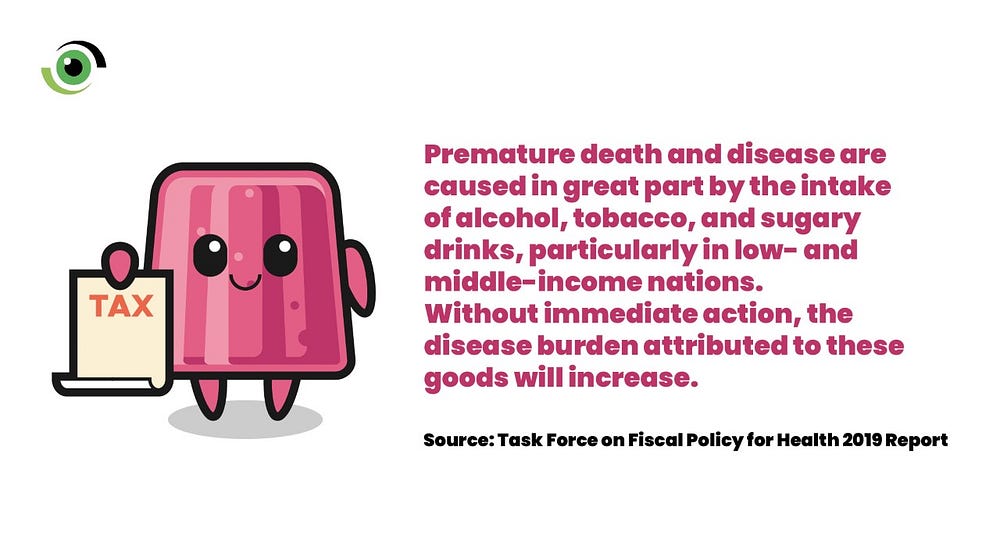
(6) Reducing the burden of Non-communicable Diseases
In 2018, NCDs accounted for an estimated 29% of all deaths in Nigeria. The overarching goal of Nigeria’s ‘National Multi-sectoral Action Plan for the Prevention and Control of Non-communicable Diseases (2019–2025)’ is to significantly reduce the burden of NCDs in Nigeria, in line with global NCD prevention and control targets. If the strategic areas and priority interventions outlined in this document are implemented at an appropriate scale, Nigeria will be closer to achieving Sustainable Development Goal 3.5. It aims to reduce, by one third, premature mortality from non-communicable diseases through prevention and treatment and promote mental health and well-being by 2030.
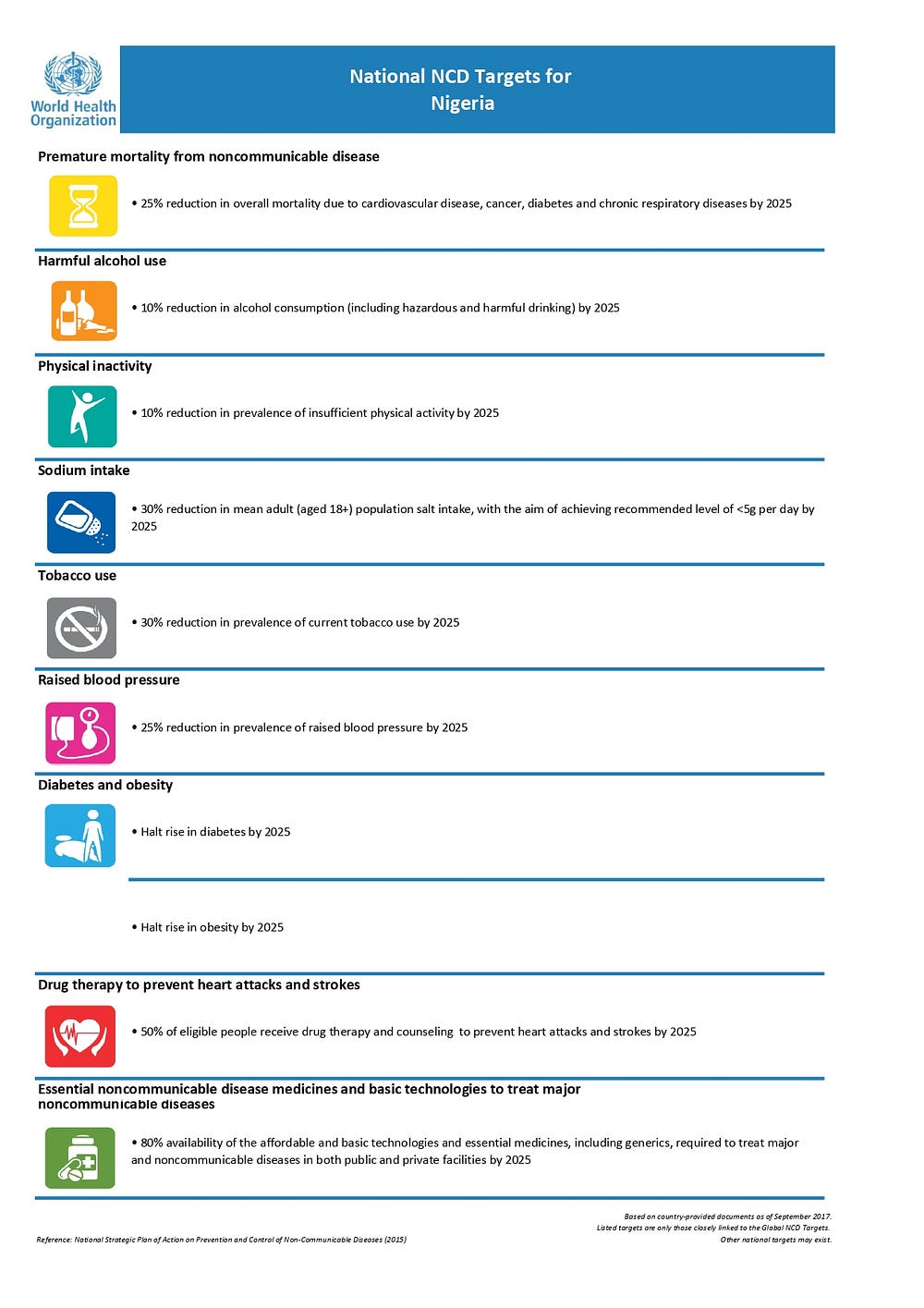
(7) Taking bold action to tackle climate change
In his address at a side event during the United Nations (UN) Conference on Climate Change #COP27, President Muhammadu Buhari, pointed out that despite contributing the least to emissions, developing countries are experiencing the greater impacts of climate change. He demanded for urgent action to be taken by countries most responsible for the emissions that cause climate change. Countries agreed to boost the support of finance, technology and capacity building needed by developing countries, including the creation of a specific fund for loss and damage to assist developing countries.
Nigeria’s Climate Change Bill was passed in November 2021. It provides an overarching legal framework for the achievement of Nigeria’s climate goals. While some commitment has been made towards tackling climate change, it has not featured prominently in the political discourse. This must change, as bold action is necessary to implement notable clauses in the Act and fulfil commitments to strengthen Nigeria’s resilience against the impact of climate change.
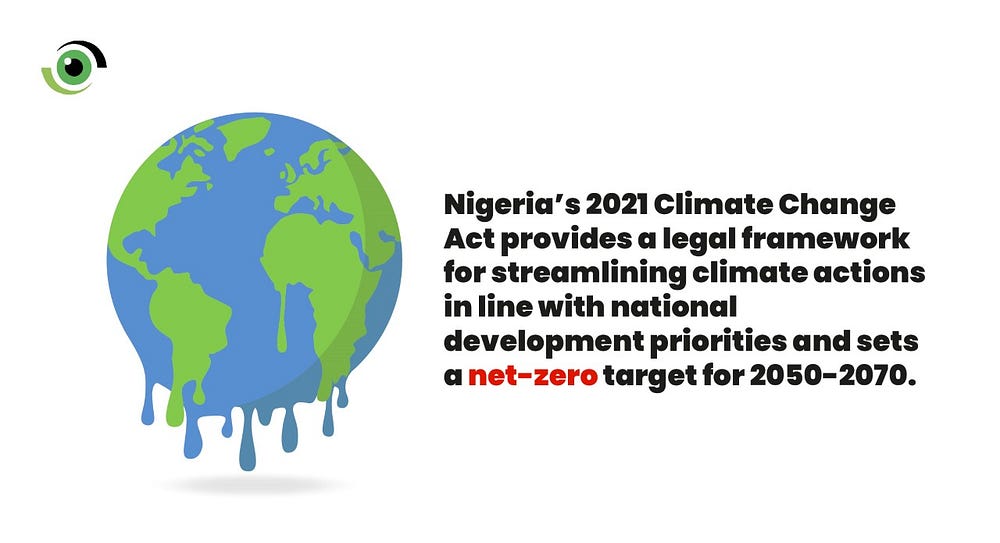
(8) Nutrition — ensuring Nigeria’s food security
The impact of climate change is quite evident in Nigeria, with devastating floods, increased desertification, erosion, and pollution. The unprecedented floods in the months of August to November, particularly worsened Nigeria’s already fragile food security situation, especially in the North-East, where the Boko Haram conflict has pushed 8.4 million people into food insecurity. The 2022 Global Hunger Index ranks Nigeria 103rd among 121 countries facing hunger crisis in the world. A 27.3 score on the Index shows that Nigeria has a level of hunger that is severe.
In October, the African Development Bank in partnership with the Islamic Development Bank, the International Fund for Agricultural Development (IFAD) and the Nigerian government initiated the ‘Special Agro-industrial Processing Zones’ (SAPZ) programme to end hunger and achieve food security in Nigeria. Programmes like this will help strengthen resilience in nutrition and food security in Africa, as they align with the objectives behind the African Union’s (AU) decision to tag 2022 the ‘Year of Nutrition’.
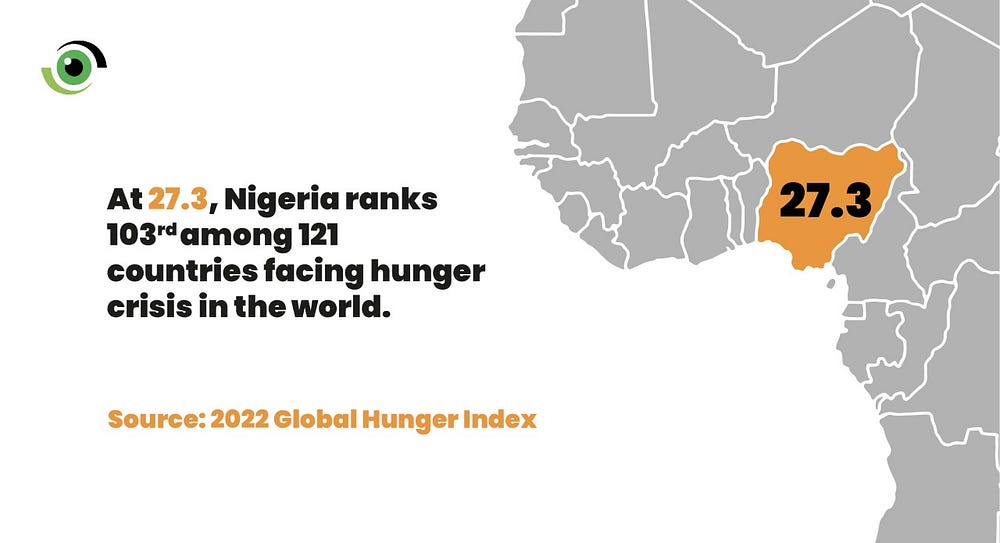
(9) Gender parity in Nigeria: a mirage?
In the days leading up to the International Women’s Day, the Nigerian National Assembly rejected five key gender-equality bills that have the potential to put increased social and political power in the hands of women. Following nationwide backlash, the decision was partially rescinded, a significant win for women’s rights advocates across Nigeria. It provided evidence that well-coordinated political pressure by civil society organisations can produce real change. Currently, only seven out of 109 senators and 22 of 360 members of the House of Representatives are women. Yet, women comprised 47 percent of registered voters during the last election in 2019.
Violence against women and girls remains the most widespread human rights violation around the world. 22.3% of Nigerian women still experience lifetime physical and/or sexual intimate partner violence. Given Nigeria’s conservative, religious and cultural leanings, women’s rights still have a long way to go before it is accepted into mainstream policies, and actions are taken. Nonetheless, continued, and focused advocacy can yield social and political dividends as was seen with the National Assembly.
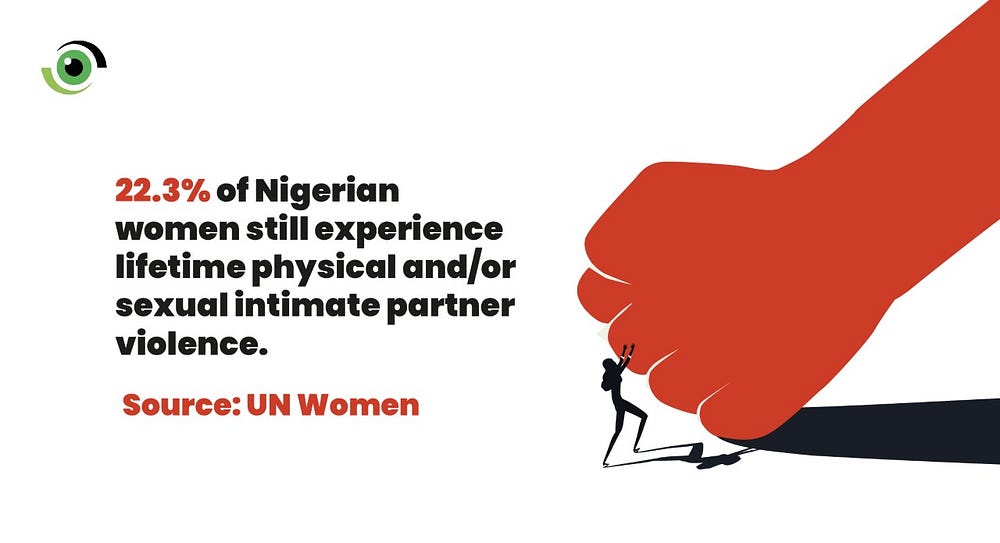
(10) Putting health in its place of prominence in the political discourse
The 8th edition of the Future of Health Conference themed ‘The Political Economy of Health: Investing in the Future of Nigeria’ was convened to remind political leaders that health is as critical to a nation’s development as the economy, infrastructure, security and other priority issues.
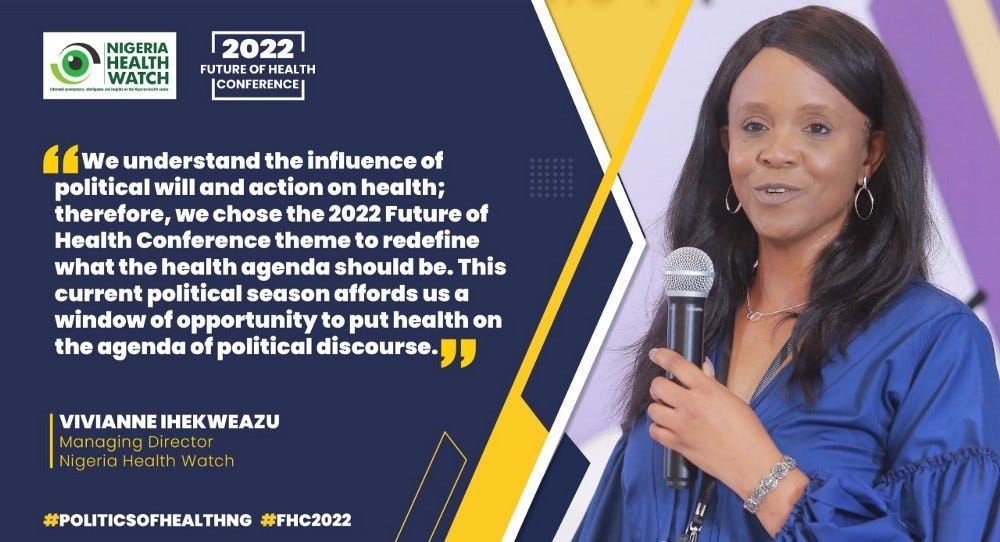
However, this is not where the discourse began. In 2018, Nigeria Health Watch launched the #Vote4HealthNaija, a nationwide advocacy campaign designed to push health up the political agenda and build an active citizenship for health by encouraging Nigerians to demand for health and to consider health when considering who gets their votes.
Prioritising health is a political choice. Nigeria needs strong political leadership and commitment to improve access to affordable healthcare for all, including people living with disabilities.
Seven years to achieving the health for all agenda
In 2023, we will be seven years away from 2030. It is the year where the UHC2030, FP2030, and the SDG Agendas and others will be realised. Regrettably, Nigeria is not on track to meet these targets. But we can make significant progress if we make health a priority.
The 2023 elections present an excellent opportunity for us to ensure that health is given its rightful position and the #Vote4HealthNaija campaign is still leveraging the momentum around the upcoming elections to encourage Nigerians to elect political leaders who will place healthcare top on their agenda — not just in word but in deed.
So, come February 2023, we encourage every eligible voter to please #Vote4HealthNaija.


